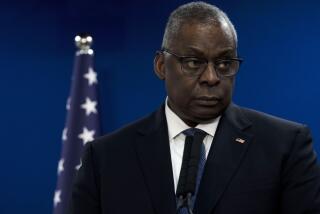Yeltsin Leaves Hospital for 3 Hours
- Share via
MOSCOW — Russian President Boris N. Yeltsin returned to work in the Kremlin on Tuesday after a two-week illness but was back at his suburban hospital three hours later after finding next year’s budget still in dispute, the economy still stumbling and the conflict in Chechnya still destabilizing his country.
All is not well in Russia as it nears the end of 1997. But it could certainly be described as familiar. Even the Mir space jalopy continued to disappoint on schedule, with the third postponement in as many weeks of a spacewalk needed to fix a modular door that won’t close.
Much was made of Yeltsin’s brief appearance at his Kremlin office, where he met with his chief of staff and other administrative aides to assess the state of his troubled nation. The 66-year-old leader, who has been sidelined for much of his second term with heart ailments, quintuple bypass surgery and a bout of pneumonia, had been hospitalized at the Barvikha sanitarium since Dec. 10 with what his entourage described as a cold.
“The president spent about three hours at the Kremlin today. Now he is back in Barvikha,” presidential spokesman Sergei V. Yastrzhembsky told reporters at what he said would be the last official briefing this year. He described Yeltsin’s decision to return to his hospital bed after the short workday as “a compromise” with doctors, who had been urging him to take at least one more week off.
Yastrzhembsky left open the possibility that Yeltsin may take a vacation as soon as later this week, after a second tete-a-tete with senior government leaders on Friday.
While the sacrosanct New Year’s Day holiday is still a week away, and the Jan. 7 Orthodox Christmas and Jan. 14 Orthodox New Year celebrations will shutter government through the middle of next month, an atmosphere of resignation already permeates the Kremlin, and plans have been shelved for a long-awaited analysis of the country’s economic performance.
Yeltsin had been expected to give an assessment Dec. 1 of his government’s efforts to pay $1.6 billion in overdue state wages by the end of the year and to evaluate the prospects for boosting public revenues from tax collection and privatization.
But an ethics scandal involving a handful of his top aides forced one delay of what was expected to be a harsh calling of accounts, and his illness has compelled the Kremlin to put off the reckoning until sometime next year.
First Deputy Prime Minister Boris Y. Nemtsov announced Monday that the last payment from government coffers to the state wage fund had been ordered for Tuesday, but millions on the state payroll were still awaiting their wages because of concurrent financial squeezes on local governments unable to ante up their shares.
The most crucial test of Russian politicians’ ability to set the national economy in order could come today, when the opposition-controlled Duma, the lower house of parliament, takes up the 1998 budget for a second reading. Pro-government deputies say it will be passed in the interest of economic stability, but many from the disgruntled Communist Party that has the largest faction in the Duma are threatening to torpedo the spending plan.
Communist and nationalist deputies oppose deep cuts in military and security forces spending, pointing to humiliating debacles like this past weekend’s bungled hostage crisis in Moscow as examples of the risks run by cost-cutting in intelligence and defense. A senior officer of the Federal Security Service was killed along with the lone gunman in a spray of gunfire that ended a standoff outside the Swedish Embassy.
Both government and opposition figures are also fuming over the latest siege of Russian federal troops surrounding Chechnya. About 40 armed Chechens stormed a unit in Dagestan. Three civilians were killed in the effort to repel the attackers.
More to Read
Sign up for Essential California
The most important California stories and recommendations in your inbox every morning.
You may occasionally receive promotional content from the Los Angeles Times.














